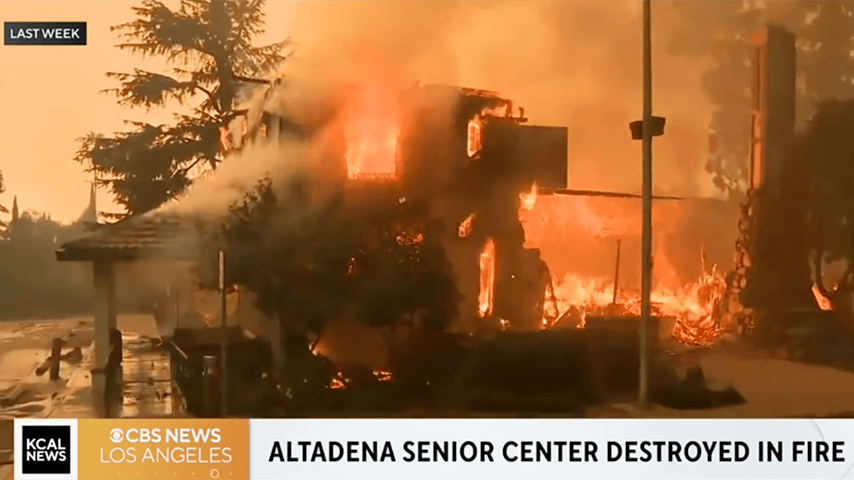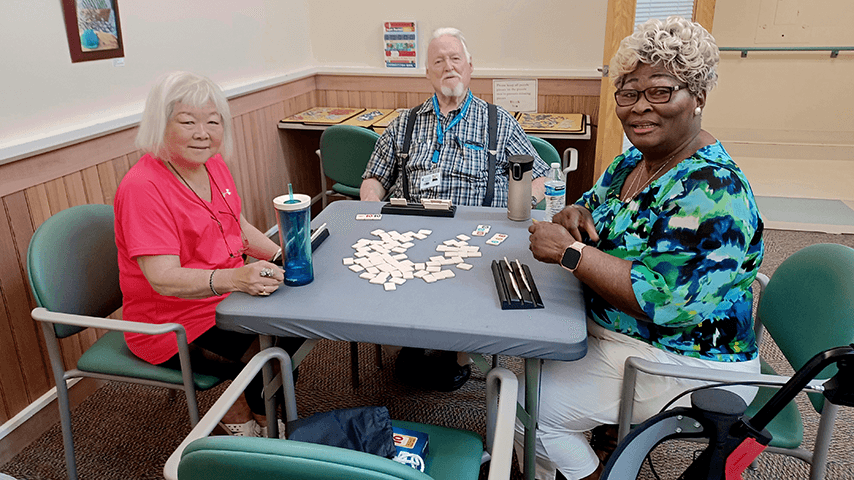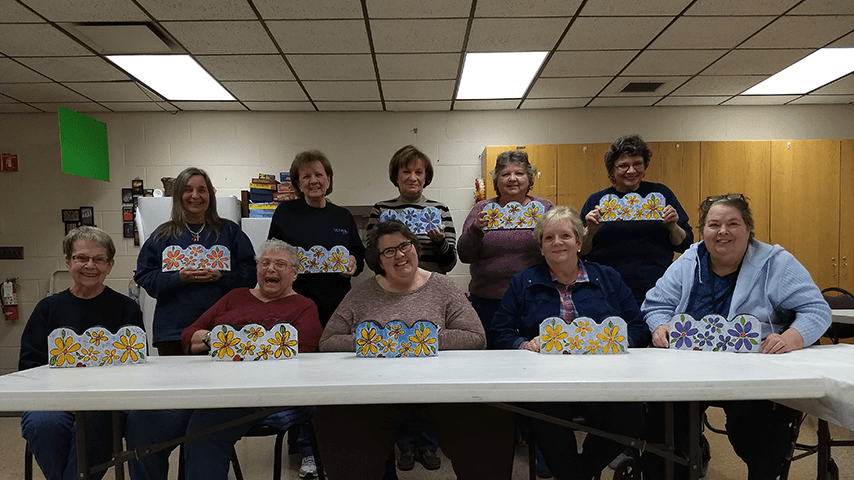Senior Center Spotlight: ONEgeneration Takes Intergenerational Approach to Meet Community Needs
7 min read

A unique model that blends adult day care with childcare while also offering an array of support for older adults in California’s San Fernando Valley, ONEgeneration is committed to “intergenerational services and programs that intertwine human needs for both giving and receiving in meaningful, daily contact.”
NCOA’s Board of Directors and staff recently had an opportunity to visit ONEgeneration and left impressed by the organization’s impact on the community.
What is the history of ONEgeneration?
ONEgeneration, the first senior center in California to achieve National Accreditation, was founded in 1978 as a modest storefront senior center initiated, operated, and directed by visionary volunteers. Over time and in response to changing demographics, ONEgeneration expanded and evolved to meet the continuum of older adults’ needs at the Senior Enrichment Center, Adult Daycare/Adult Day Care Health Center, and in their own homes.
In 1994, ONEgeneration added a childcare program. “This highlighted our commitment to intergenerational (adult daycare and childcare in a shared setting) services and programs that intertwine human needs for both giving and receiving in meaningful, daily contact,” according to the center’s website. “This philosophy has become our guiding value, as well as what is unique and most highly celebrated at ONEgeneration.”
Today, OneGeneration operates from two campuses that are within a mile of each other in buildings that are leased from the city for $1 a year in recognition of the services they provide to the community. The Mark Taper Intergenerational Center is home to both an adult day center and a childcare/preschool program.
This dual location has created opportunities for incredible intergenerational programs that result in meaningful connections and bonds between older adults and young children through shared activities like creative art, cooking, movement, music, pet therapy, gardening, and games.
The second campus is the home of the original program, the Senior Enrichment Center, a more traditional senior center experience and the location that NCOA visited. The building is older but well-maintained, comfortable, and inviting. It is clearly a welcoming space that is well used by the community.
The programs and activities at the center include:
- An array of exercise classes including dance
- Creative arts programs (including improv acting)
- Arts and crafts
- Games
- Discussion and support groups, etc.
The center has a popular travel program and offers on-site health screenings and evidence-based health programs, counseling, tax preparation, legal assistance, and transportation. The Senior Enrichment Center is clearly a place where older adults gather to improve their lives through wellness and social engagement.
Who comes to ONEgeneration?
At the center, “Individuals of all ages and backgrounds are drawn to our intergenerational approach,” according to ONEgeneration’s website.
Throughout the West San Fernando Valley of Los Angeles, ONEgeneration serves:
- Older adults, particularly those who are low-income, homebound, and/or medically frail
- People with Alzheimer’s Disease or other forms of dementia
- People with long term illnesses such as cancer, HIV/AIDS, or Parkinson’s Disease
- People recovering from a stroke
- Caregivers for older adults or the very young
- Infants and children ages 6 weeks – 6 years
- At-risk youth, including foster children and teen parents
- Developmentally disabled youth and adults
At the center, opportunities to participate in activities like a knitting group provide not only a chance to connect but also a way to exercise creativity with purpose. One participant’s pride was palpable in showing character caps she was creating to raise money.
The center’s activities to promote physical activity are, of course, embedded in fun. On the day of our visit there was a full house participating in Halloween Zumba, costumes included.
At the core of the center is how ONEgeneration supports older adults in accessing basic housing and nutrition. ONEGgeneration really shines in addressing the economic insecurity that is pervasive in the area. More than 70% of their registered participants are considered low-income. So, while they offer many programs, their primary focus is on social services to meet the basic needs of the community. They provide information and referral, case management, and benefits enrollment.
Their general intake forms for the center include a nutrition screening, and they provide a congregate meal, homebound meal delivery, and access to Meals on Wheels. Additionally, they offer a food pantry and host the Encino Farmers Market, which generates revenue for the organization. ONEgeneration provides assistance with enrolling in CalFresh, California’s SNAP program, through an NCOA grant funded by WalMart.
How is ONEgeneration addressing the problem of homelessness?
Homelessness is a growing problem in the area, with the percentage of older adults who are homeless or at risk rising.1,2 ONEgeneration’s Housing Navigation program was established to help. The range of issues of people served by the housing navigators include those facing three-day evictions, those who are homeless, or those at risk of becoming homeless.
The center partners with shelters and housing, makes direct referrals, provides financial help, and connects people to not-for-profit legal services. They connect those who are homeless and living in their car to one of the city’s safe parking lots. The program serves 25 people a month who are homeless or at risk with walk-in services and many more through their intake line that receives 20-30 calls a day for all types of information.
ONEgeneration is always looking for ways to better serve people. They leveraged their SNAP grant with their housing services so that people are screened for hunger and housing at the same time. They also developed a creative solution to the lack of housing options in partnership with the city by accessing unused Accessory Dwelling Units (ADU), sometimes called granny flats. Through this initiative, they identified ADU’s, matched older adults with the owners, and, through city funding, subsidized the rentals. The result: they found housing for 32 older adult in 25 units and were on track to expand to 50 units until the city reduced funding.
What are some challenges for ONEgeneration?
The passion and creativity of ONEgeneration to address the needs of the community is only tempered by the availability of funding. In addition to some support from the city and the Older American’s Act funding they receive for nutrition and social services, they are relentless in their pursuit of grant funding and are tireless fundraisers. They have partnerships with many organizations and agencies. They rent their facility on the weekends and hold multiple fundraisers to keep programs going.
The greatest asset at ONEgeneration is their workforce that includes paid staff and countless volunteers. They are led by Jenna Hauss who started at ONEgeneration as a student intern and fell in love with the work. She rose through the ranks to her position as CEO and brings an energy and passion to the organization that is unparalleled.
While the Senior Enrichment Center’s workforce is relatively stable, and they have a commitment to older workers, recruiting from the center first, they do struggle with recruitment and retention in other parts of the organization. Workforce is an ongoing concern, especially in the childcare and adult day care, nutrition, and transportation programs. With a minimum wage of $16, prospective employees can make more working for a rideshare or in a service business.
What does modernizing mean at ONEgeneration?
ONEgeneration is in a constant state of growth, expanding and shifting to meet the needs of the community. They are a model operation and continue their relentless pursuit of supporting their community in aging well.
When asked what modernization means for them, Hauss said, “It means looking at the future generations of older adults and what they want and need. Being able to read the community and adapt programs to the changing community.”
Still not a member of the National Institute for Senior Centers? Join today, membership is free.
If your center has engaged in a recent study or assessment, we’d love to hear about it. And if you haven't already, we'd encourage you to join the National Institute of Senior Centers (NISC). Free to all senior centers (and their personnel), NISC supports senior centers with best practices and innovations in programming, as well as networking and training opportunities. Ask for help, leverage NISC resources, or share your successes like the ONEgeneration. Find out how you can become a NISC Affiliate today.
Photo courtesy ONEgeneration
Sources
1. Homelessness in Los Angeles County. Los Angeles Almanac. Found on the internet at https://www.laalmanac.com/social/so14.php
2. Los Angeles Homeless Services Authority. Greater Loss Angeles Homeless Count 2020. Found on the internet at https://cao.lacity.org/Homeless/hsc20200625d.pdf



